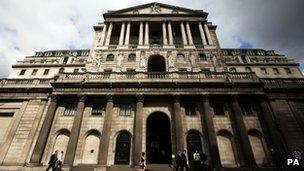Bank of England 'has room to raise interest rates'
- Published

The Bank of England has held interest rates at 0.5% since March 2009
The Bank of England could raise interest rates a "fair amount" without hurting homeowners taking up the government's Help to Buy scheme, according to one of its policymakers.
Ben Broadbent, who is on the committee that decides rates, was asked how rate rises would affect those new borrowers.
"I think there is a fair amount they could go up before borrowers got into great difficulties," he told Sky News.
But he added that a rate rise must not be allowed to "choke off" recovery.
Rates would only go up if the economy was in good health - or if inflation was out of control, said Mr Broadbent. "We want to ensure that this recovery continues and is not choked off by a premature rise in interest rates," he told Sky News.
Interest rates have been at a record low 0.5% since 2009.
A rise in interest rates would mean an increase in mortgage payments for most homeowners, which could lead to a rise in repossessions if people were unable to afford the higher monthly payments.
Under the second phase of the Help to Buy scheme, which is now in place, borrowers across the UK can put down a deposit of as little as 5% of the property price. The government provides a seven-year taxpayer guarantee to the lender covering 15% of the loan value. It is available for properties sold for up to £600,000 in the UK.
There are concerns that Help to Buy may lead to another housing bubble and borrowers could get into trouble when rates do eventually rise.
Mr Broadbent told Sky News that "the numbers entering this [Help to Buy] scheme are relatively low and although interest rates will, as you say, at some point start to rise, it is worth remembering quite how low a level we are starting from."
'Don't know'
Last week, the Bank's chief economist, Spencer Dale, said that economic conditions are unlikely to improve enough to merit a rise in rates next year.
Hugh Pym on Tweeting at the Bank of England
In a Q&A on Twitter, external, Mr Dale said: "Rates will only rise when had sustained period of strong growth as long as no risk to stability."
He was also asked how many mortgage repossessions there'll be when interest rates return to long-term average.
"Don't know," he replied., external "But when we raise interest rates economy should be stronger, higher employment, higher real wages."
Mr Dale and Mr Broadbent are two of the nine people at the Bank who set monetary policy.
In its last minutes, the Bank's Monetary Policy Committee (MPC) said it would make no change to the £375bn of monetary stimulus it is providing through its quantitative easing (QE) programme.
The programme, brought in to give an extra stimulus because interest rates could barely be cut below the current 0.5%, has been criticised by some for helping the financial markets and the banks, by making money cheap, rather than the economy as a whole.